Infrastructure
Explained: Why India's First Water Metro Is A Game Changer For Urban Mobility With Innovative, Inclusive And Sustainable Approach?
V Bhagya Subhashini
May 01, 2023, 10:55 AM | Updated 10:55 AM IST
Save & read from anywhere!
Bookmark stories for easy access on any device or the Swarajya app.
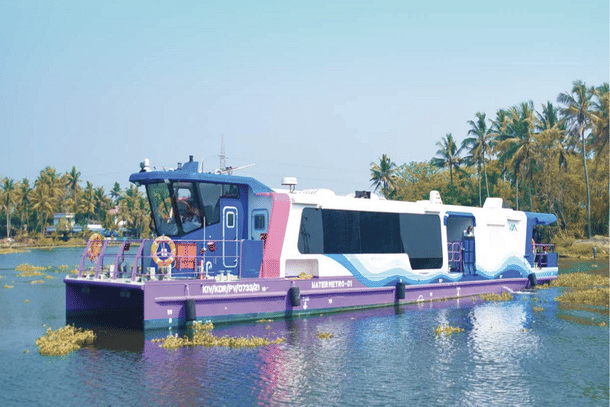
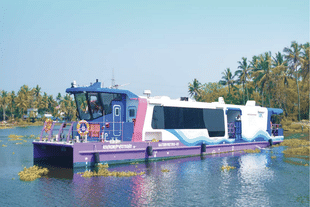
Kochi, one of the fastest-growing cities in India is situated in a complex estuarine system that comprises Lake Vembanad and several rivers, including the Periyar and Muvattupuzha.
Water transport has been critical to the growth and development of Kochi and the state of Kerala in general. At the beginning of the 20th century, 90 per cent of residents used small boats to reach the mainland.
However, as new roads and bridges were built, they gradually began to shift to road-based transportation. Currently, inland water transport is used by less than 3 per cent of the population.
This modal shift in Kochi has increased traffic congestion and air pollution, which are made worse by unplanned urban growth, sparse road network, and the city's nearly doubling private vehicle ownership rate.
To address this issue, the State of Kerala, through the Kochi Metro Rail Limited (KMRL), has commercially launched the Kochi Water Metro project recently.
The Kochi Water Metro is an integrated water transport initiative that seeks to enhance connectivity between the mainland and the islands of Kochi.
The project aims to improve the livelihoods and living standards of both islanders and the general public. It is expected to benefit more than 1,00,000 islanders.
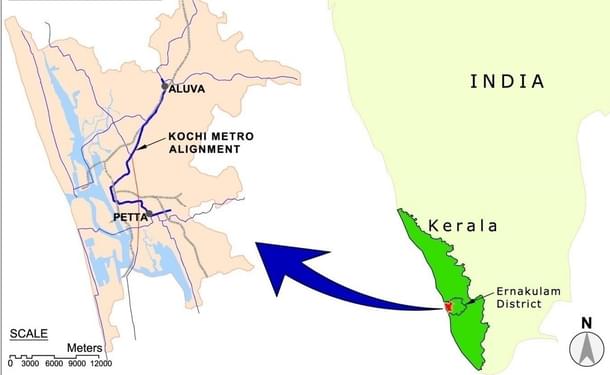
The project is expected to significantly reduce travel time from one part of the city to another. It is projected to decongest the city's ever-increasing traffic and significantly reduce the city's carbon impact.
Once Phase-I is fully operational in 2024, it is expected to serve 34,000 passengers a day.
Waterways and Identified routes
The Kochi water metro project envisages the development of 15 identified routes connecting 38 jetties across 10 islands and two boatyards. The overall length of the line is 76.2 km.
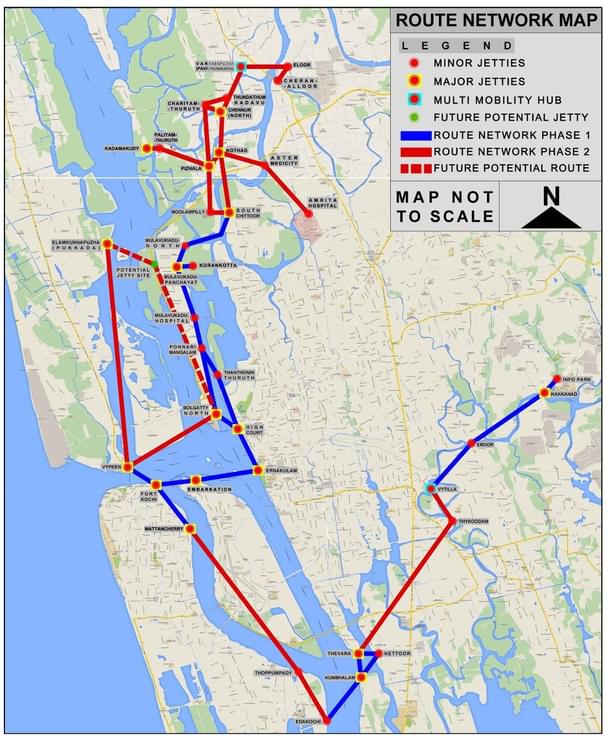
Why Kochi Water Metro Is Game Changer for Urban Commute?
Innovative Boat Technology
The water metro will have 78 eco-friendly boats for passenger service — 23 of them will have capacity of 100 passengers and the remaining 55 are meant for 50 passengers.
The boats constructed by Cochin Shipyard Limited (CSL), are hybrid and battery-powered.
The boats use Lithium Titanate Oxide (LTO) batteries that can be charged in 15 minutes using a specially built charging system. LTO batteries are not only the safest commercially accessible batteries in the world, but they are also the longest-lasting, with a life cycle of 7-10 years.
The ferries would have diesel-powered generator back up, which will take over their operation automatically, in the event of any failure of the battery system.
The ferries are designed to create very less waves over the narrow channels even at high speed and would provide commuters a silent mode of transport.
Integrated Transport
The Kochi water metro project's primary features include integration with the Kochi Metro, existing bus terminals, taxis, rickshaws and other water transport systems, allowing for the creation of a single ticket network system for the city of Kochi's public transportation system.
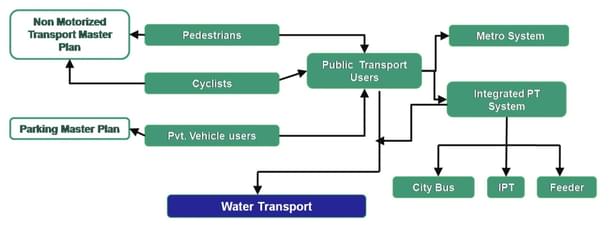
Safety First
The Kochi Water Metro's automatic passenger control system, which can limit the number of passengers inside the boat based on its capacity, is another notable feature.
This approach eliminates crowding, which is believed to be the main contributor to accidents in water transport.
An automatic boat location system will continuously monitor their position from the Operating Control Centre (OCC) at Vytilla Mobility Hub.
The Operation Control Centre, which will act as the main hub for coordinating the entire operation and be responsible for disaster management, real-time tracking of the boat, and passenger safety monitoring, will also have overall command and control over the entire fleet.
Four work boats combined with an ambulance will help with maintenance and emergency response.
Sustainable Mobility and Green Future
The Kochi Water Metro is a groundbreaking project for environmentally friendly urban water transportation.
Upon full implementation, it is anticipated that using electric propulsion for the boats will reduce greenhouse gas emissions by at least 16,500 tonnes annually.
This project contributes to India's goal of becoming carbon-neutral by 2070.
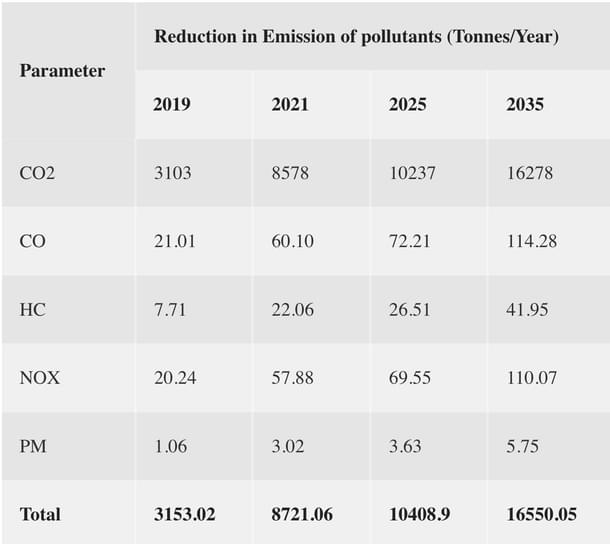
The boats were designed to minimise noise and wave effects that can erode banks and have an impact on the flora and fauna that inhabit the rivers. They were composed of lightweight, recyclable materials.
To prevent any discharges from harming the backwaters and Vembanad Lake, one of the largest lakes in India, toilets were not made available within the vessels.
Additionally, efforts are underway to identify land in several districts of Kerala for the establishment of a 17 MW solar farm in order to achieve carbon-neutral status for the water metro.
According to Loknath Behera, the managing director of KMRL, the Kochi Metro rail services and Water Metro will be fully solar-powered by 2024,
Socially Inclusive and Gender-Responsive
The system also follows a universal design with features that are both inclusive and gender-responsive. For instance, its terminals include floating pontoons so that people with disabilities can board and disembark the boats safely and easily, regardless of tidal variations.
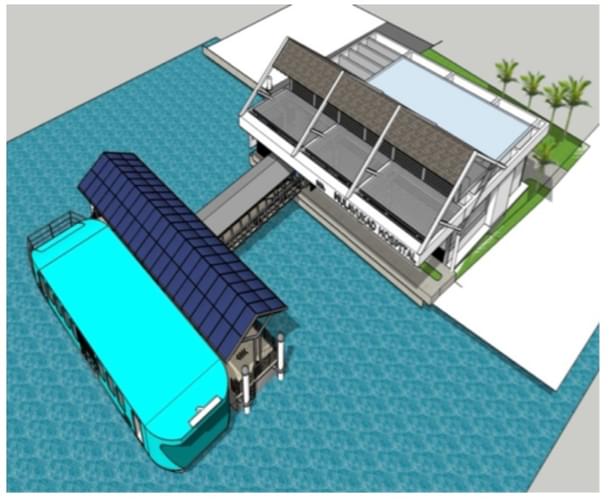
Apart from this, Women from the Kudumbasree self-help group will do the housekeeping, ticketing, and related jobs at terminals.
Boost to Tourism In Gods's Own Country
The majority of the islands are located to the north of Ernakulam. Surprisingly, visitors are unaware of these islands and the enormous tourism potential they may offer.
Thousands of tourists who arrive on luxury cruise ships are transported by road to Alappuzha and Kumarakom for a backwater experience. This is happening at a time when Ernakulam holds a treasure mine of pristine islands to the north, including Thanthonnithuruthu, Mulavukadu, Moolampilly, Pizhala, Kadamakkudy, and Kothad. All of the islands can be accessed by boat from Ernakulam.
The foreign tourist arrival during the year 2021 is 60,487, the domestic tourist arrival is 7,537,617, indicates the state's immense tourism potential.
The Water Metro project is poised to tap and enhance Kerala's tourism potential by improving connectivity between islands, backwaters, and mainland.
To conclude, the Kochi water metro, when finished, will be the world's largest system of centrally managed urban water transportation.
V Bhagya Subhashini is a staff writer at Swarajya. She tracks infrastructure developments.




